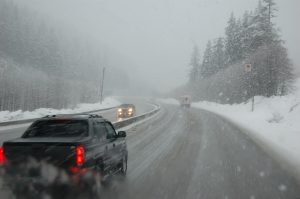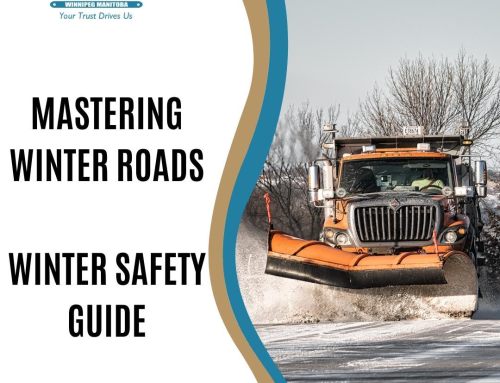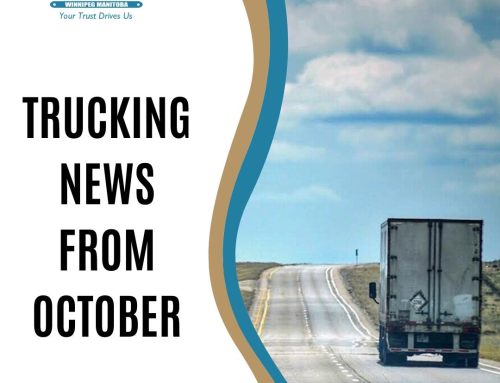 Winter is challenging for truck drivers. Ice, snow, storms, and freezing temperatures all have their particular risks; in addition to the general risk drivers are exposed too. How you deal with the additional risk is the same as you deal with the normal challenges and risks of being a truck driver – good driving habits. Here are 10 good practices to get into which can keep you out of, or help you through, difficult situations.
Winter is challenging for truck drivers. Ice, snow, storms, and freezing temperatures all have their particular risks; in addition to the general risk drivers are exposed too. How you deal with the additional risk is the same as you deal with the normal challenges and risks of being a truck driver – good driving habits. Here are 10 good practices to get into which can keep you out of, or help you through, difficult situations.
- Add fuel conditioner to your fuel. It seems like a no brainer but if your coming up north from the south, you’re not using winter fuel. Add conditioner before you hit the colder northern temps. Always ensure you have conditioned fuel when you drop your truck for your days off and the truck will be sitting for a while.
- When you come home for days in, drop your truck with full fuel tanks. This helps prevent your fuel from freezing.
- Ensure you have your winter emergency kit.
- Check weather reports regularly along your route. Conditions can change rapidly, particularly, in the mountains.
- Check mountain passes before you start up the mountain. If there’s chain up warnings – stop and wait them out. Each mountain state has highway and road condition hotlines.
- We can’t always stop when there’s inclement weather. You need to understand when it’s getting too bad to drive before it’s too bad to drive. This can be tricky for inexperienced drivers. As the operator it’s your responsibility to ensure you can get down the road safely. You have nothing to prove to Super Trucker driving when it’s unsafe to drive. Part of driving safely is knowing when enough is enough, and to worry about driving tomorrow.
- Don’t run your fuel low. You may need to stop for several days in extreme circumstances and that will use fuel. You don’t want to be running low in the first place and run out of fuel. If your in sparsely populated areas, such as out west, a good rule of thumb is to plan to fuel when you have 3/8 to half remaining.
- If you’re unsure if there is black ice on the road or you’re in fog, do not use the cruise control. It’s much easier to get out of a slide while using your foot to control the throttle.
- When ever you stop, check your marking lights and keep them clear of snow.
- Increase your following distance, give yourself more time to stop, and reduce your speed.
Road Condition Information in Mountain States
Washington State Driving & Road Conditions- http://www.wsdot.com – has traveler info including mountain pass info and road closures.
Check by Phone: In State 511; Out of State 1-800-695-7623
Oregon Driving & Road Conditions- http://www.tripcheck.com – has traveler info including mountain pass info and road closures.
Check by Phone : In State 511; Out of State 503-588-2941
California Driving & Road Conditions- http://www.dot.ca.gov/roadsandtraffic.html – has traveler info including mountain pass info and road closures.
Check by Phone: In State 511; Out of State 800-427-7623
Montana Driving & Road Conditions- http://www.mdt.mt.gov/travinfo/ – has traveler info including mountain pass info and road closures.
Check by Phone; In State 511; Out of State 800-226-7623
Idaho Driving & Road Conditions – http://511.idaho.gov/ – has traveler info including mountain pass info and road closures.
Check by Phone; In State 511; Out of State 1-888-432-7623
Utah Driving & Road Conditions – http://www.udot.utah.gov – has traveler info including mountain pass info and road closures.
Check by Phone; In State 511; Out of State 866-511-UTAH (8824)
Nevada Driving & Road Conditions – http://nvroads.com/ – has traveler info including mountain pass info and road closures.
Check by Phone; In State 511; Out of State 1-877-NV-ROADS
Colorado Driving & Road Conditions – http://www.coloradodot.info/ also see their I70 corridor site for a lot of useful trucking info http://www.trucki70.com/ – has traveler info including mountain pass info and road closures.
Check by Phone; In State 511; Out of State 877-315-ROAD
British Columbia Driving & Road Conditions – http://www.drivebc.ca/ also see http://tranbc.ca/– has traveler info including mountain pass info and road closures.
Phone; 800-550-4997




